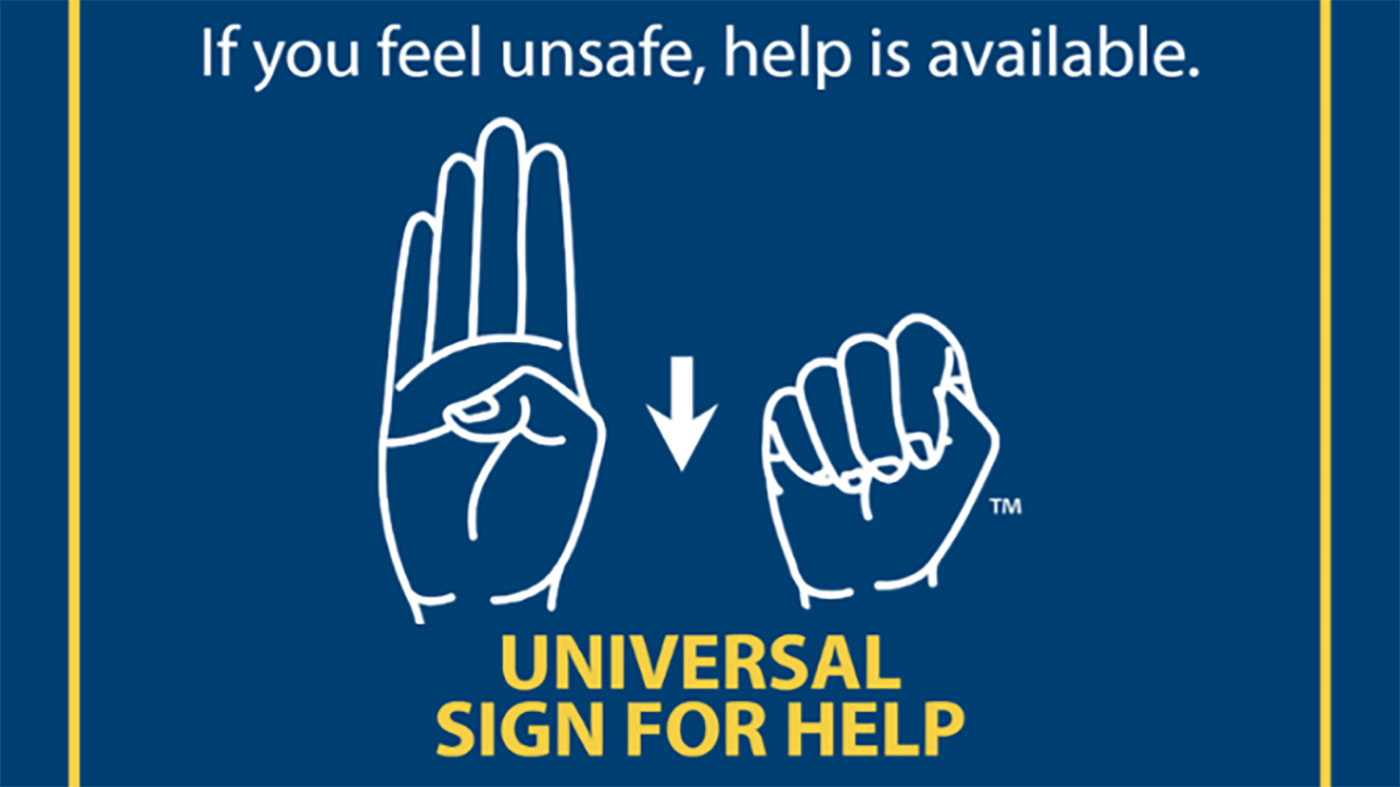The Universal Sign for Help can be used in any situation where someone feels unsafe or threatened, if they feel they are being followed, are with an abusive partner at an appointment or are being trafficked.
According to a 2022 study, intimate partner violence (IPV) is a growing concern for the military and Veteran community. IPV includes any behavior in a current or former intimate relationship that causes physical, psychological or sexual harm, including coercion and stalking.
Approximately 13% of active duty service members and Veterans reported recently using IPV against a partner, and around 21% reported recently experiencing IPV. This is notably higher compared to the civilian population where around 6% reported past year IPV use against a partner and around 5% reported experiencing IPV.
Veteran populations had significantly higher rates of IPV use compared to active duty service members, potentially due to stressors associated with the military-to-civilian transition or reluctance to disclose abuse, and better screening and reporting processes for Veterans.
To provide support to Veterans, their partners and VA staff who work with Veterans affected by IPV or who experience IPV themselves, Healthcare Advancement and Partnerships facilitates a partnership with Johns Hopkins University’s School of Nursing in collaboration with VA’s Intimate Partner Violence Assistance Program to increase awareness of and access to myPlan.
The myPlan website and free app was developed by the Johns Hopkins School of Nursing to help individuals assess their risk and make important safety decisions if they believe they may have experienced IPV. The goal of the partnership is to increase Veterans’ access to the app to support and enhance safety for those who experience IPV.
“Healthcare Advancement and Partnerships supports providing Veterans with accessible and equitable health care. Partnerships that raise awareness of and provide resources to address concerns like intimate partnership violence are imperative,” said Heather Luper, Healthcare Advancement and Partnerships social work program manager. “The partnership with Johns Hopkins School of Nursing allows VA to increase support for Veterans affected by IPV.”
Overview of the Universal Sign for Help
The Universal Sign for Help was created by the Canadian Women’s Foundation in response to the rising numbers of IPV related to self-isolation during the COVID-19 pandemic to provide individuals with a way to silently communicate to providers when they are in unsafe situations during telehealth and other virtual appointments.
It is a discreet hand gesture where a person intentionally folds the four fingers over the thumb. Since its creation, the Universal Sign for Help has gained widespread recognition on social media becoming an internationally recognized method for people to silently signal they need help.
The Universal Sign for Help can be used in any situation where someone feels unsafe or threatened, if they feel they are being followed, are with an abusive partner at an appointment or are being trafficked, which is a separate but equally serious crime that should be reported.
The signal can also be used by a provider who is with an unstable patient and may need assistance to discreetly deescalate the situation.
When VA staff sees someone using the Universal Sign for Help, they should attempt to move the person to a secure, private location to inquire about their concerns and then respond accordingly. This may involve providing resources or contacting VA Police for assistance.
To ensure those who use the VA health care system are aware of the Universal Sign for Help, VA collaborated with the Assault and Harassment Prevention Office to develop and distribute a toolkit, tip sheet and awareness materials for VA staff. Materials included displaying hand signal on posters in high-traffic areas.
“VA recognizes the need for a discreet method for Veterans and others to ask for help when experiencing IPV safety concerns,” said LeAnn Bruce, national program manager. “The Universal Sign for Help fills that need and is one of many ways VA is actively working to address intimate partner violence among service members, Veterans and their families.”
Resources
- Become a Signal for Help Responder: Sign up and complete the Canadian Women’s Foundation Signal for Help responder mini course to become a Signal for Help responder.
- Intimate Partner Violence Experience among Women Veterans: State of the Research: This presentation discussed research on psychological, physical and sexual forms of IPV experiences among women Veterans over the past decade.
- Intimate Partner Violence Assistance Program (IPVAP) Coordinator Directory: A comprehensive list of IPVAP coordinators by state.
- VHA Assault and Harassment Prevention Office: Provides information and resources on harassment and other harmful behaviors as well as resources for those who are in unsafe situations.
- National Domestic Violence Hotline: Call 1-800-799-7233 for 24/7 confidential support.
Get more information about:
Topics in this story
Link Disclaimer
This page includes links to other websites outside our control and jurisdiction. VA is not responsible for the privacy practices or the content of non-VA Web sites. We encourage you to review the privacy policy or terms and conditions of those sites to fully understand what information is collected and how it is used.
More Stories
Veteran Byron Potier weighed almost 300 pounds and was tired and lethargic. He was the perfect candidate for gastric sleeve surgery.
How much do you know about VA care, benefits and services? Don’t miss out on what you've earned—check out the "2025 VA Federal Benefits Guide for Veterans, Dependents, Survivors, and Caregivers" handbook to learn more.
Feeling stressed? Your breath can help you relax and focus. Take 3 minutes to reset and prioritize your well being for this week's #LiveWholeHealth practice.







WOW—WOW……I NEVER KNEW HOW TO, IN A SITUATION SILENTLY TO SIGNAL FOR HELP. THIS TOPIC ABOUT THE SILENT SIGNAL, IS A LESSON OF KNOW HOW TO RECOGNIZE “”NEED HELP””.